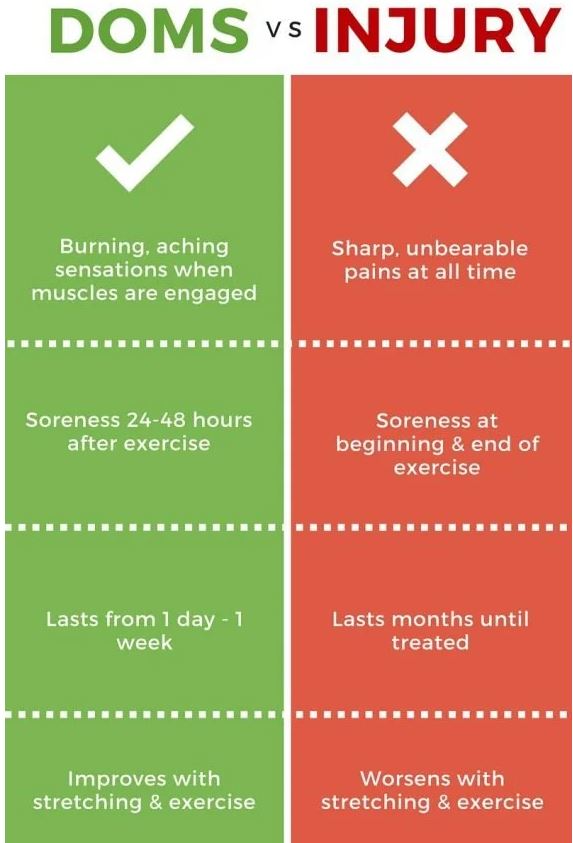Should You Run If Your Legs Are Sore?

If your leg soreness is mild and is simply the result of a previous workout or physical activity (commonly known as delayed onset muscle soreness or DOMS), it’s generally safe to go for a run.
No matter what type of workouts you are doing, there is a certain amount of soreness that is to be expected.
- How do you know if it is discomfort you should run through?
- When is it essential to listen to your body and take a rest day?
- What is the difference between a running injury and general soreness in recovery?
As always, when you have questions, we have answers.
When and Why Do Athletes Get Sore Legs?
After a tough workout, it is not uncommon for large muscle groups to be quite sore. One of the most frequent causes of soreness is delayed onset muscle soreness (or DOMS). The following things can lead to it:
- Strength Training: Weight lifting, especially lifting heavy, can cause soreness. This is because lifting causes microtears in the muscle fibers and damage to the tissue. This is what builds muscle. It is vital to give your body time to bounce back.
- Overuse: Running too many miles in a row, too many days without a day off, or increasing mileage too quickly can cause overuse soreness or even injury. This can lead to stress fractures or shin splints if the athlete is not careful.
- Overtraining: Similar to overuse, those who overtrain often fail to respect the rest day. Any great running coach will tell you that rest days are essential to any training plan. If you are not a fan of a rest day, at the very least, work some zero or low-impact training into your schedule.
- Speed Work: Not every run can be easy; however, it is equally as dangerous to try to incorporate speed work into the running regimen too often.
Is It OK to Run With Sore Legs?
Knowing the difference between normal muscle soreness and pain from injury can be challenging. If your discomfort is sharp or prolonged, it may be an injury. However, general muscle soreness is altogether different.
Think about your last hard run. Did you wake up sore the next day? Were your leg muscles a bit achy, and was it hard to roll yourself out of bed?
A good rule of thumb is if it gets a bit better as you start to move around, it is probably okay to get a workout in. Just remember that you want to follow up a strenuous effort with a more leisurely workout day.
Running on sore or tired legs will likely have you slowing down, which is perfectly okay!

Should You Take a Day Off From Running If Your Legs Are Sore?
If you take regular rest days and are a little sore, you can try to run through the discomfort.
However, if you are experiencing sharp pain or have limited range of motion, you may be best off taking a break.
Do You Run Slower with Sore Legs?
Sore muscles (and sore legs) usually have you running slower than you typically run. Trying to hammer your way through muscle soreness is counterproductive and can set your training back. Easy running is an excellent form of recovery.
Feeling a little “creaky” when starting the day after a challenging workout is also normal. Be patient with your body and kind to yourself.
What are Some Ways to Help Sore Legs?
- Active Recovery: Non-impact (or low-impact) cross-training helps with active recovery. This can include swimming, biking, kayaking, etc.
- Easy Run: A nice easy run can aid in muscle recovery as it works out the lactic acid that has built up.
- Foam Rolling: A foam roller is a magical invention that can help work the kinks out. Rolling helps improve blood flow in the area that is bothering you.
- Ice: Sometimes, a sore muscle just needs an ice pack for a short time. There are also athletes (and coaches) who swear by an ice bath for recovery.
- Massage Gun: My personal favorite method of combating muscle pain is a massage gun.
- Nutrition: Remember to pay attention to proper fuel. Staying fueled during a workout and refueling post-workout are ways to help combat soreness.
- Prevention: Taking a good warm-up and cool-down are excellent ways to prevent soreness. Post-run stretching can help with recovery and soreness. Keep track of the miles on your running shoes so you don’t wear them long after the structure has broken down to prevent potential injury.
- Stretching: Both dynamic and static stretching can help your muscles feel good. Just remember not to do static stretching on cold muscles.
- Yoga: An excellent way to avoid soreness is regular yoga practice.
More simple ways to prevent muscle soreness can be found here.
How Long Does It Take for Sore Legs To Go Away?
General soreness is usually better in a day or two. Discomfort from heavy lifting may linger for a bit longer.
Pain that does not improve, even after a couple of easy days or a day of rest, is likely more serious. Sharp pain or pain that lingers may require a visit to a sports medicine clinic. Finding a good physical therapist can often help ge
Latest Articles
 Is Running on a Treadmill Easier Than Running Outside?Runners have their own preferences, whether it is treadmill running, running outside on the road, or exploring trails. So...
Is Running on a Treadmill Easier Than Running Outside?Runners have their own preferences, whether it is treadmill running, running outside on the road, or exploring trails. So... Is It OK to Use Trail Running Shoes on the Road?While trail running shoes can be used on roads, especially in situations where a runner encounters mixed terrains or pref...
Is It OK to Use Trail Running Shoes on the Road?While trail running shoes can be used on roads, especially in situations where a runner encounters mixed terrains or pref... How to Fix Sore Quads After Running?Rest, ice, gentle stretching, and over-the-counter pain relievers can help soothe sore quads after running. Also, ensure ...
How to Fix Sore Quads After Running?Rest, ice, gentle stretching, and over-the-counter pain relievers can help soothe sore quads after running. Also, ensure ... 10 Fruits With The Most Electrolytes to Replace Sports DrinksThese fruits are high in electrolytes such as potassium, magnesium, and calcium, essential for hydration, muscle function...
10 Fruits With The Most Electrolytes to Replace Sports DrinksThese fruits are high in electrolytes such as potassium, magnesium, and calcium, essential for hydration, muscle function...

